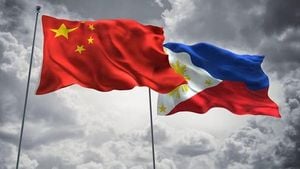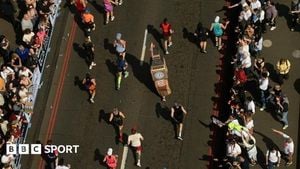When the dust settled at the Paris Olympics, Filipino gymnast Carlos Yulo emerged as a true champion, clinching not one, but two gold medals within 48 hours. It was more than just personal glory; this achievement marked him as the Philippines' first male gold medalist ever, propelling his country’s mixed emotions from joy to concern—especially as personal struggles came to light alongside his monumental success.
Yulo dazzled audiences with his breathtaking performances, first on August 3, securing victory in the Men's Floor Exercise. Just the next day, he followed it up with another gold medalist triumph, this time dominating the Men’s Vault Final. Amidst cheers and celebrations, his prowess on the mat painted the Philippines—an archipelago of over 100 million people—in the glow of sporting glory.
Back home, Carlos' win was met with massive joy and excitement. Citizens took to social media to congratulate him, showering him with praise for bringing pride to the nation. The government quickly took notice, announcing plans for a grand homecoming parade to honor Yulo, alongside other notable Filipino athletes like boxers Nesthy Petecio and Aria Villegas, who also competed fiercely at the games.
But, alas—like any good plot twist, the euphoria surrounding Yulo's victories soon became clouded with familial drama. Hours after his historic wins, social media exploded with scandal when Yulo failed to mention his mother, Angelica Yulo, in his acceptance speeches. Instead of congratulatory cheers, many found themselves engaged in the scandal—their attention swayed by accusations and familial accusations seeping through the cracks of his success.
The drama unfolded publicly, fueled by social media. Yulo's mother posted on Facebook, seemingly disregarding her son's accomplishments, and instead referencing another gymnast, which didn't help her public image amid the onslaught of scrutiny. It soon came to light: Yulo had felt betrayed by his mother for taking money from his account when he won at the 2022 World Championships. A tense back-and-forth ensued where each felt their side of the story justified, but most of all, it served to take attention away from Yulo's gold medals.
Yulo’s rise to stardom was clouded by this rift, with online commentators split on their loyalties. Some sided with the young gymnast, others lambasted his mother. It seemed like the dried ink of victory was overshadowed by the bitterness of personal strife. Analysts painted the situation as emblematic of the struggles many athletes face, particularly the financial challenges they endure.
Indeed, the struggles of Filipino athletes, including Yulo, extend beyond the mat. Many find themselves receiving minimal financial support, often struggling to cover training expenses. According to reports, Yulo's success has raised awareness about the challenges the nation’s athletes typically endure—the stark reality has shed light on the casual neglect these sports heroes receive from corporate sponsors and the government until they reach the pinnacle of success.
This was especially apparent when Yulo joined the ranks of his compatriot, weightlifter Hidilyn Diaz. After winning the Philippines’ first ever gold medal at the Tokyo 2020 Olympics, Diaz's personal struggles with financial backing led her to publicly plead for assistance, digging deep for sponsors to help her achieve her goals on the world stage. After her victory, she received monumental incentives, which reflected the shift from hardship to national celebration.
Yulo's own financial incentives are now coming to the forefront of discussion as megaslideshow advertisements reveal significant rewards for Olympic winners. For his wins, Megaworld Corporation offered Yulo not just any prize, but a luxurious three-bedroom condo at McKinley Hill Development, located within Taguig City—seriously upping the ante of this venture. Earlier, the company had announced gifts for gold medalists at the Paris Olympics, but after Yulo's double gold, the company boosted their offer, thanks to the timing coinciding with their efforts to encourage local champions.
Curiously enough, even beyond the lavish condo, the government is also supporting Yulo with substantial cash prizes. The Philippine Amusement and Gaming Corporation (PAGCOR) plans to reward him with P20 million, equivalent to approximately $346,000 for the first gold medal, and other government arms are contributing additional sums. This outpouring of rewards reflects the potential athlete-centric shifts within the Philippines, pushing for more support and incentives for medalists.
Yulo's steps to victory and subsequent financial support signify more than just personal achievement; they stand as markers of progress for Philippine sports as they strive for recognition beyond the medals. The pen and podium have interwoven to tell both the glamorous and grim tales of success, and it’s hard not to wonder what these conflicts mean for the budding careers of other Filipino athletes.
While demands for recognition remain, the true measure lies within nurturing young talent and ensuring they can thrive without familial distractions pulling them down. Carlos Yulo's story encapsulates the bittersweet essence of triumph mixed with adversity, showcasing both the resolve of the human spirit and the integral need for continued national support to leverage such victories. "Beneath the envy and the social media snapshots lies the true heart of the matter—how do we support our champions reliably and honestly?" one analyst pointed out.



